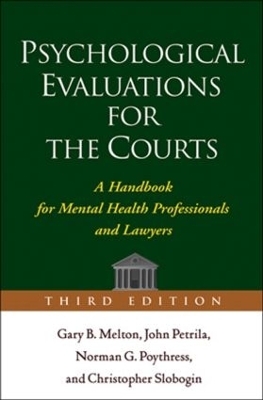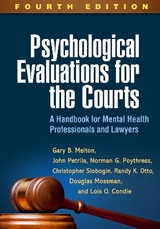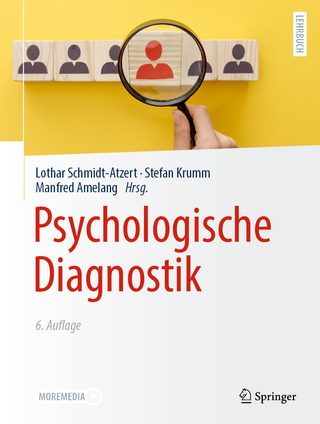
Psychological Evaluations for the Courts, Third Edition
Guilford Publications (Verlag)
978-1-57230-966-1 (ISBN)
- Titel erscheint in neuer Auflage
- Artikel merken
This is the definitive reference and text for both mental health and legal professionals. The authors offer a uniquely comprehensive discussion of the legal and clinical contexts of forensic assessment, along with best-practice guidelines for participating effectively and ethically in a wide range of criminal and civil proceedings. Presented are findings, instruments, and procedures related to criminal and civil competencies, civil commitment, sentencing, personal injury claims, antidiscrimination laws, child custody, juvenile justice, and more.
Gary B. Melton, PhD, is Professor of Psychology and Director of the Institute on Family and Neighborhood Life at Clemson University, and a fellow in the Centre for Psychology and Law at the University of the Free State in South Africa. He is a past president of Childwatch International, the American Orthopsychiatric Association, the American Psychology–Law Society, and the American Psychological Association (APA) Division of Child, Youth, and Family Services. He is the recipient of three APA Distinguished Scientific Contribution Awards (for Psychology in the Public Interest, Public Service, and International Advancement of Psychology), among many other honors for his research and public service. The author of more than 300 publications, Dr. Melton has traveled in more than 40 countries, in most cases for research, consultation, or lecturing; his work has been cited by U.S. courts at all levels; and he has been an advisor to the U.S. Attorney General and the U.N. Committee on the Rights of the Child. Dr. Melton served as vice-chair of the U.S. Advisory Board on Child Abuse and Neglect and as national vice-president of Parents Anonymous, and he was a member of panels of the National Academy of Sciences on mistreatment of older adults and on training of health professionals about family violence. John Petrila, JD, LLM, is a professor in the Department of Mental Health Law and Policy at the University of South Florida. He served as chair of the Department from 1992 to 2004. He has also been General Counsel to the New York State Office of Mental Health and Director of Forensic Services in the Missouri Department of Mental Hygiene. Mr. Petrila is past president of the International Association of Forensic Mental Health Services and a member of the MacArthur Foundation Research Network on Mandated Community Treatment. He has published widely on mental health law and policy issues. He is the coeditor of the journal Behavioral Sciences and the Law, the coeditor of Mental Health Services: A Public Health Perspective, and a coauthor of The Effectiveness of Involuntary Outpatient Treatment, the RAND Institute’s study on the effectiveness of outpatient civil commitment. Norman G. Poythress, PhD, is a professor in the Department of Mental Health Law and Policy at the University of South Florida. He is a past president of the American Psychology–Law Society and was the 1990 recipient of the American Academy of Forensic Psychology’s Award for Distinguished Contributions to Forensic Psychology. Dr. Poythress has served as a consultant to two MacArthur Foundation Research Networks, and his own research has been funded by the MacArthur Foundation and the National Institute of Mental Health. He previously served as an expert panelist in the development of a benchbook for psychological evidence, a project of the American Bar Association’s Commission on Mental and Physical Disability Law, and he recently served on a committee of the Institute of Medicine, National Academy of Sciences, that developed recommendations regarding ethical guidelines for research involving prisoners as participants. Christopher Slobogin, JD, LLM, is the Milton Underwood Professor of Law at Vanderbilt University Law School. In the early 1980s Mr. Slobogin helped establish Virginia’s outpatient forensic evaluation system as Director of the University of Virginia’s Forensic Evaluation Center and also directed a legal aid program at a state mental hospital. Coauthor of Law and the Mental Health System, the leading law school textbook on mental health law, he has authored over 40 articles and books on that subject. He has served as chair of the Law and Mental Disability Section of the American Association of Law Schools, reporter for the American Bar Association’s Standards on the Insanity Defense, coreporter for the ABA’s Resolution on Mental Disability and the Death Penalty, and editor/reviewer for several professional journals. Phillip M. Lyons, Jr., JD, PhD, is Professor of Criminal Justice and an affiliate faculty member with the Clinical Psychology Doctoral Program at Sam Houston State University. He is also the Executive Director of the Texas Regional Center for Public Safety Innovation. Before graduate and law school, Dr. Lyons worked as a peace officer in the Houston area. When he left full-time law enforcement, he was a detective specializing in crimes involving children. His academic interests lie largely in the areas of public policy that affect children and law enforcement policy, with the aim of promoting inclusiveness, community engagement, and social support. He currently serves on the American Psychological Association’s ad hoc Committee on Legal Issues. Randy K. Otto, PhD, is an associate professor in the Department of Mental Health Law and Policy at the University of South Florida. He also serves as adjunct faculty at Stetson University College of Law in Gulfport, Florida, and in the Department of Psychology and the Department of Rehabilitation and Mental Health Counseling at the University of South Florida. Dr. Otto’s research, writing, and practice focus on forensic psychological assessment, and he has served as president of the American Academy of Forensic Psychology, the American Psychology–Law Society, and the American Board of Forensic Psychology. He chaired the Committee on Legal Issues of the American Psychological Association and currently spearheads the committee revising the Specialty Guidelines for Forensic Psychologists, which are published jointly by Division 41 of the American Psychological Association and the American Board of Forensic Psychology.
I. General Considerations
1. Law and the Mental Health Professions: An Uneasy Alliance
2. An Overview of the Legal System: Sources of Law, the Court System, and the Adjudicative Process
3. The Nature and Method of Forensic Assessment
4. Constitutional, Common-Law, and Ethical Contours of the Evaluation Process: The Mental Health Professional as Double Agent
5. Managing Public and Private Forensic Services
II. The Criminal Process
6. Competency to Stand Trial
7. Other Competencies in the Criminal Process
8. Mental State at the Time of the Offense
9. Sentencing
III. Noncriminal Adjudication
10. Civil Commitment
11. Civil Competencies
12. Compensating Mental Injury: Workers' Compensation and Torts
13. Federal Antidiscrimination and Entitlement Laws
IV. Children and Families
14. Juvenile Delinquency
15. Child Abuse and Neglect
16. Child Custody in Divorce
17. Education and Habilitation
V. Communicating with the Courts
18. Consultation, Report Writing, and Expert Testimony
19. Sample Reports
20. Glossary
| Erscheint lt. Verlag | 25.10.2007 |
|---|---|
| Verlagsort | New York |
| Sprache | englisch |
| Maße | 178 x 254 mm |
| Gewicht | 1754 g |
| Themenwelt | Geisteswissenschaften ► Psychologie |
| ISBN-10 | 1-57230-966-0 / 1572309660 |
| ISBN-13 | 978-1-57230-966-1 / 9781572309661 |
| Zustand | Neuware |
| Informationen gemäß Produktsicherheitsverordnung (GPSR) | |
| Haben Sie eine Frage zum Produkt? |
aus dem Bereich



